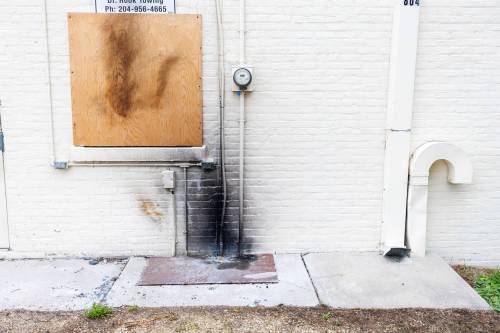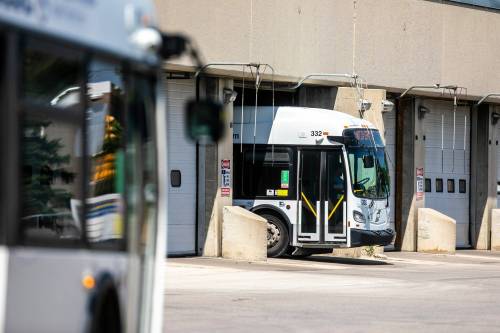Law
Ottawa orders unprecedented posthumous appeal of fourth Indigenous man’s conviction in 1973 slaying
5 minute read Preview Monday, Sep. 29, 2025Situation near school sparks safety concerns
4 minute read Thursday, Sep. 25, 2025Less than 100 metres away from an Elmwood elementary school’s front door, several bike wheels and frames lie around a front yard with garbage piled high in a shopping cart near the home’s fence.
Parents and staff at River Elm School are concerned for student safety due to suspicious activity at the home.
One school staffer, who the Free Press is not naming, has witnessed trucks full with scrap metal, eavestroughs and bikes idle outside the home. He also saw what he believed to be drug deals on and near the property.
“It’s become this twisted joke among staff that all of this is happening and no one is doing anything about it,” he said. “It’s a huge blight on the neighbourhood.”
Charges upgraded to attempted murder in summer sword attack
2 minute read Preview Wednesday, Sep. 24, 2025Manitoba Crown attorneys take important step toward meaningful bail reform
5 minute read Tuesday, Sep. 23, 2025For years, politicians have been locked in an endless cycle of sloganeering about bail reform. You’ve probably heard it, especially from the federal Conservatives: “jail, not bail.”
The idea is that Canada’s bail laws are too weak, too “soft on crime,” too quick to release dangerous offenders back onto the street. It’s an easy line to deliver, and it taps into public anger over violent crime. But like most easy lines, it’s not grounded in reality.
We’re now beginning to learn, at least in Manitoba, why some repeat offenders charged with serious crimes may be released on bail when they shouldn’t be. And it has nothing to do with the law itself. It has everything to do with how bail court is actually run day-to-day — the nuts and bolts of how cases are handled.
On Monday, the Manitoba Association of Crown Attorneys pulled back the curtain on a system that is in disarray. They released a discussion paper and held a news conference to tell Manitobans what really goes on in bail court. Their message was clear: prosecutors often don’t have enough time, information or resources to properly argue bail cases.
Police investigating fires, vandalism at NDP cabinet ministers’ North End constituency offices
4 minute read Preview Tuesday, Sep. 23, 2025Foster parents charged, accused of assaulting children in their care
6 minute read Preview Tuesday, Sep. 23, 2025Another subdivision, another city problem
5 minute read Preview Tuesday, Sep. 23, 2025Bail reform as an approach to crime reduction
5 minute read Preview Saturday, Sep. 20, 2025Hudson’s Bay seeks approval to auction off 1670 charter, court filings show
5 minute read Preview Monday, Sep. 22, 2025Bus riders, drivers welcome police safety initiative; two arrests made on day plan rolled out
5 minute read Preview Friday, Sep. 19, 2025Same crime, different fate
4 minute read Thursday, Sep. 18, 2025If Donald Trump were a religious man, he might have said “There but for the grace of God go I” when he heard that former Brazilian president Jair Bolsonaro has been sentenced to 27 years in prison. Bolsonaro’s crime was to have plotted a coup to take back the presidency he lost in the 2022 election.
Trump is acutely aware of the similarities between Bolsonaro’s case and his own bumbling, half-hearted attempt to incite a coup on Jan. 6, 2021. Both men were voted out after a single term in office, both immediately declared that the election had been stolen by the opposition, and both then chickened out of a coup at the last moment.
Trump feels the parallels so keenly that he did not just condemn the Bolsonaro trial, claiming that it was a “witch-hunt.” Although the United States has a positive trade balance with Brazil, Trump has imposed 50 per cent tariffs on imports from Brazil as an explicit punishment for putting his friend and ally on trial.
Trump must be feeling close to all-powerful right now. Only eight months into his second term after a triumphant comeback election, he is nearing the point where he can sweep the whole 238-year-old constitutional apparatus of the United States aside and rule by decree.
Drunk driver who killed woman in 2022 hit-and-run denied parole
6 minute read Preview Thursday, Sep. 18, 2025City council threatens rights without delivering safety
5 minute read Wednesday, Sep. 17, 2025As the City of Winnipeg appears poised to implement new rules that target people who live in encampments, questions should be raised about who — if anyone — will be safer as a result.
Winnipeg city council’s community services committee recently unanimously approved a motion, introduced and amended by Coun. Cindy Gilroy and seconded by Coun. Sherri Rollins, to prohibit encampments in and around a wide range of spaces, including playgrounds, pools, schools, daycares, transit stops, bridges and rail lines. It also directs the city to expand enforcement across all other city spaces during daylight hours, which could mean issuing bylaw tickets. The motion will go to council’s executive policy committee before a final vote by council.
While some, including Mayor Scott Gillingham, have described these new rules as a “balanced approach” to deal with encampments, we have seen this type of approach before and it does not work.
The motion is framed around safety, especially for children and families. That concern should not be dismissed — no one disputes that unsafe materials have been found in public spaces, but tying those concerns directly to encampments offers a misleading choice. It suggests that the safety of families must come at the expense of people experiencing homelessness. And with Winnipeg’s child poverty rate the highest in the nation, many of the children and families this ban claims to protect are also among those it targets.
Mayor, inner circle want assaults on firefighters, paramedics added to Criminal Code
4 minute read Preview Wednesday, Sep. 17, 2025Manitoba municipalities and financial controls
4 minute read Tuesday, Sep. 16, 2025Late last month, Manitoba Auditor General Tyson Shtykalo released a report aimed at ensuring the provincial government exercises greater oversight over spending by municipal governments across the province.
Following a yearlong investigation of allegations of financial mismanagement by several local governments, the AG discovered that the province does not currently have a comprehensive process to follow up on complaints regarding municipal governments, review financial submissions made by them, or even monitor the spending of provincial grants they receive.
Shtykalo emphasized that the province provides millions of dollars in funding to municipalities annually and that, “With this funding comes a responsibility — both for municipalities and the Department of Municipal and Northern Relations — to ensure effective stewardship of public resources.”
To many Manitobans, that is likely regarded as nothing more than stating the obvious. All recipients of public funds must handle those monies with care and be both transparent and accountable for how the dollars are spent. And yet, the auditor general found that adequate controls are not currently in place to ensure that is happening.



















